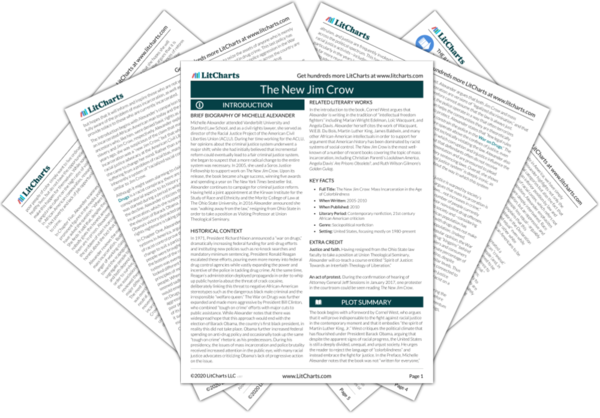Welcome to the LitCharts study guide on Michelle Alexander's The New Jim Crow. Created by the original team behind SparkNotes, LitCharts are the world's best literature guides.
The New Jim Crow: Introduction
A concise biography of Michelle Alexander plus historical and literary context for The New Jim Crow.
The New Jim Crow: Plot Summary
A quick-reference summary: The New Jim Crow on a single page.
The New Jim Crow: Detailed Summary & Analysis
In-depth summary and analysis of every chapter of The New Jim Crow. Visual theme-tracking, too.
The New Jim Crow: Themes
Explanations, analysis, and visualizations of The New Jim Crow's themes.
The New Jim Crow: Quotes
The New Jim Crow's important quotes, sortable by theme, character, or chapter.
The New Jim Crow: Characters
Description, analysis, and timelines for The New Jim Crow's characters.
The New Jim Crow: Symbols
Explanations of The New Jim Crow's symbols, and tracking of where they appear.
The New Jim Crow: Theme Wheel
An interactive data visualization of The New Jim Crow's plot and themes.
Brief Biography of Michelle Alexander
Michelle Alexander attended Vanderbilt University and Stanford Law School, and as a civil rights lawyer, she served as director of the Racial Justice Project of the American Civil Liberties Union (ACLU). During her time working for the ACLU, her opinions about the criminal justice system underwent a major shift; while she had initially believed that incremental reform could eventually lead to a fair criminal justice system, she began to suspect that a more radical change to the entire system was necessary. In 2005, she used a Soros Justice Fellowship to support work on The New Jim Crow. Upon its release, the book became a huge success, winning five awards and spending a year on The New York Times bestseller list. Alexander continues to campaign for criminal justice reform. Having held a joint appointment at the Kirwan Institute for the Study of Race and Ethnicity and the Moritz College of Law at The Ohio State University, in 2016 Alexander announced she was “walking away from the law,” resigning from Ohio State in order to take a position as Visiting Professor at Union Theological Seminary.
Get the entire The New Jim Crow LitChart as a printable PDF.

Historical Context of The New Jim Crow
In 1971, President Richard Nixon announced a “war on drugs,” dramatically increasing federal funding for anti-drug efforts and instituting new policies such as no-knock searches and mandatory minimum sentencing. President Ronald Reagan escalated these efforts, pouring even more money into federal drug control agencies while vastly expanding the power and incentive of the police in tackling drug crime. At the same time, Reagan’s administration deployed propaganda in order to whip up public hysteria about the threat of crack cocaine, deliberately linking this threat to negative African-American stereotypes such as the dangerous black male criminal and the irresponsible “welfare queen.” The War on Drugs was further expanded and made more aggressive by President Bill Clinton, who combined “tough on crime” efforts with major cuts to public assistance. While Alexander notes that there was widespread hope that this approach would end with the election of Barack Obama, the country’s first black president, in reality this did not take place. Obama further increased federal spending on anti-drug policy and occasionally took up the same “tough on crime” rhetoric as his predecessors. During his presidency, the issues of mass incarceration and police brutality received increased attention in the public eye, with many racial justice advocates criticizing Obama’s lack of progressive action on the issue.
Other Books Related to The New Jim Crow
In the introduction to the book, Cornel West argues that Alexander is writing in the tradition of “intellectual freedom fighters” including Marian Wright Edelman, Loïc Wacquant, and Angela Davis. Alexander herself cites the work of Wacquant, W.E.B. Du Bois, Martin Luther King, James Baldwin, and many other African-American intellectuals in order to support her argument that American history has been dominated by racist systems of social control. The New Jim Crow is the most well-known of a number of recent books covering the topic of mass incarceration, including Christian Parenti’s Lockdown America, Angela Davis’ Are Prisons Obsolete?, and Ruth Wilson Gilmore’s Golden Gulag.
Key Facts about The New Jim Crow
- Full Title: The New Jim Crow: Mass Incarceration in the Age of Colorblindness
- When Written: 2005-2010
- When Published: 2010
- Literary Period: Contemporary nonfiction, 21st century African American criticism
- Genre: Sociopolitical nonfiction
- Setting: United States, focusing mostly on 1980-present
Extra Credit for The New Jim Crow
Justice and faith. Having resigned from the Ohio State law faculty to take a position at Union Theological Seminary, Alexander will co-teach a course entitled “Spirit of Justice: Towards an Interfaith Theology of Liberation.”
An act of protest. During the confirmation of hearing of Attorney General Jeff Sessions in January 2017, one protester in the courtroom could be seen reading The New Jim Crow.












